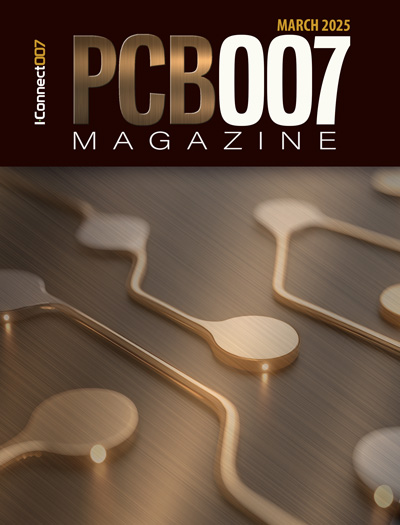-

- News
- Books
Featured Books
- pcb007 Magazine
Latest Issues
Current Issue
Voices of the Industry
We take the pulse of the PCB industry by sharing insights from leading fabricators and suppliers in this month's issue. We've gathered their thoughts on the new U.S. administration, spending, the war in Ukraine, and their most pressing needs. It’s an eye-opening and enlightening look behind the curtain.

The Essential Guide to Surface Finishes
We go back to basics this month with a recount of a little history, and look forward to addressing the many challenges that high density, high frequency, adhesion, SI, and corrosion concerns for harsh environments bring to the fore. We compare and contrast surface finishes by type and application, take a hard look at the many iterations of gold plating, and address palladium as a surface finish.

It's Show Time!
In this month’s issue of PCB007 Magazine we reimagine the possibilities featuring stories all about IPC APEX EXPO 2025—covering what to look forward to, and what you don’t want to miss.
- Articles
- Columns
Search Console
- Links
- Media kit
||| MENU - pcb007 Magazine
PCBAA Reacts to Implications of Biden’s PCB Determination
April 5, 2023 | Nolan Johnson, I-Connect007Estimated reading time: 6 minutes
Hot on the heels of the news that U.S. President Biden signed a presidential determination in support of the printed circuit board industry, I-Connect007’s Nolan Johnson spoke with David Schild, executive director of the Printed Circuit Board Association of America, about some of the expected implications. David points out, among other things, that this signals increased momentum with government and defense to support U.S.-based printed circuit manufacturing, and the possibility that a renewed interest in the industry by private financing could possibly follow.
Audio Transcript:
Nolan Johnson: Hi, Nolan Johnson here for Real Time with… I-Connect007 and I'm speaking right now with David Schild from the PCBAA. David, welcome.
David Schild: Thanks, Nolan. Great to be here.
Johnson: Just this Monday, March 27, we saw the release of a presidential determination that speaks to printed circuit board technology and its strategic importance to the U.S. economy. Talk to me about that.
Schild: It’s just a huge win for American microelectronics and printed circuit board technology. Specifically, this is something that we, as part of a joint coalition with our friends at IPC, have been pushing for over a number of months. You've seen leaders on the Hill, specifically Rep. Anna Eshoo from California and Rep. Blake Moore from Utah pushing for the recognition that printed circuit boards are part of a critical microelectronics supply chain that our Department of Defense absolutely relies on. So to see the president of the United States joining the prime minister of Canada, making that declaration last Friday, and then to see the formal presidential determination really bringing the Defense Production Act into force for our industry—that's just a huge win.
Johnson: From the perspective of someone who heads up a sales and marketing organization in electronics manufacturing, what does this mean to them?
Schild: That's a great question. So of course, much like the CHIPS Act, once you see that there's a government policy in place, a natural first question is going to be, “OK, what can I do for my business to benefit from this policy?” There is, to be clear, additional legislative and policy actions that we think need to be taken for the industry. But the presidential determination here, the use of the Defensive Production Act, drops a lot of red tape. It speeds acquisition authority and it puts the purchase, the investment, in print circuit board technologies on a fast track at the Department of Defense.
We are eager to learn more about the details around the $50 million that was announced and additional monies that might be forthcoming. We're waiting on details for the FY24 budget that we don't have yet, but what I would say to members of our industry is that I think there will be opportunities to apply for funding and actually seek out opportunities to build new technology, introduce new product via this determination.
Johnson: All right. So, with this momentum now within the government, does that change the banking institutions’ financial approach to this in a private sense?
Schild: If your question is, “Do we now have indications that government policy is going to exist and might private sector money follow that?” I'm cautiously optimistic and I base that optimism on what you saw when the CHIPS Act passed. Of course, the CHIPS Act pledges $52 billion for the semiconductor industry. By some estimates as much as $420 billion in private money got off the sidelines when we saw the CHIPS Act finally become law. Public policy guides and steers and is a sort of weathervane for private action. I would love to see the same thing in the PCB industry, but of course there's more to do over the next couple of months.
Johnson: In your organization, what are the next steps for you?
Schild: I'm glad you asked. We're a growing organization with new members every week, and we're putting those members to work. We have two additional policy initiatives: getting the presidential determination was one of three for this year and we need to continue to fight for language in the National Defense Authorization bill. That’s the bill that basically, you know, authorizes the Pentagon to spend money and direct DoD policy. We need to protect the language instituted in FY21 that says that the Department of Defense has to secure and vouch for its microelectronic supply chains extending into the commercial off-the-shelf technology (COTS) realm. That language is a “keep sold” for us. We've got to protect it every year through the implementation date in 2027. The next priority after that is going to be a standalone piece of legislation in the last Congress; we called it the Supporting American Printed Circuit Boards Act. I'm hoping it'll get a catchier name and a new number, but we anticipate that it will be reintroduced with bipartisan support soon. Then we need to go out with our members as part of a coalition approach; we need to build support and we need to get co-sponsors. We need to generate a new Senate bill and hopefully shepherd this bill in the same way that the CHIPS Act was shepherded.
Johnson: This momentum has a strong foundation in Department of Defense and military spending defense infrastructure. It's the follow-on legislation you were just mentioning that seems to really push this even further into more commercial consumer grade markets.
Schild: That's absolutely right. The defense market alone is not enough to grow and, I think in the long term, sustain U.S. manufacturing. What we need to do is, I think, two things, right? We need to redefine the word “critical” when it comes to technology applications. Our chairman, Travis Kelly, who is also the CEO of Isola, talks a lot about how we ought to take an expanded view of critical infrastructure, not just limited to the F-35, right? Or the future submarine or the wearable tech that a soldier might have, you know, as they as they go into battle. We need to think about things like the energy grid. We need to think about things like the banking infrastructure, and telecommunications. If you define those things as critical and then say you want to have trusted and reliable sourcing for the microelectronics that power those technology sets, now we're talking about a very, very strong commercial demand.
That's the first part of it, redefining what's critical. The second part, I think, is a real incentive on the demand side. Why should I buy an American board or an American IC substrate if foreign-sourced boards are so much cheaper? The answer comes in the form of a tax credit. We need to incentivize; we need to essentially have a “Buy America” provision that says we can get cost competitive with American produced technologies. That, in addition to some direct funding, is really the second, and I think, most important part of the standalone legislation we just discussed.
Johnson: Well, there certainly is a bunch of momentum.
Schild: I think that, starting two or three years ago when we were seeing shortfalls, when we were seeing empty shelves, when we were seeing people unable to deliver trucks for lack of microelectronics, it focused the nation's attention on just how extended our supply chains are. Just how, in many cases, they're not resilient, they don't have redundancy. They stretch into places we might not want them to stretch, and thus policymakers—and I think this is a bipartisan move—said, “Wow, there's real incentive now for the consumer, for our national security, for our economic strength, to build more things here in America.” And of course, it extends beyond microelectronics. But yeah, we're absolutely riding this wave, and I think it's going to continue for some time.
Johnson: Well, David, thank you for taking the time to give us an update on what's happening on Capitol Hill with this presidential determination. There is a lot going on for sure.
Schild: A very busy time. Always great to chat with you, Nolan, thank you.
Johnson: Here for I-Connect007’s Real Time with…, I'm Nolan Johnson. Thanks for listening.
Suggested Items
Kyocera Licenses Quadric’s Chimera GPNPU AI Processor IP
05/08/2025 | BUSINESS WIREQuadric announced that Kyocera Document Solutions Inc. (hereinafter: Kyocera) has licensed the Chimera™ general purpose neural processor (GPNPU) intellectual property (IP) core for use in next generation office automation system on-chip (SoC) designs.
Scanfil Boosts Investment in Electronics Manufacturing in the US
05/08/2025 | BUSINESS WIREScanfil is investing in a second electronics manufacturing line in Atlanta, Georgia, USA. The demand for manufacturing electronics in the USA has increased over the past two years and is expected to continue growing.
Cybord's Visual AI Solution to Be Integrated with Siemens' Opcenter MES
05/07/2025 | PRNewswireCybord, a leading provider of advanced visual-AI electronic component analytics, and Siemens Digital Industries Software have signed a new OEM agreement to integrate Cybord's cutting-edge AI technology with Siemens' Opcenter™ software for Manufacturing Execution Systems (MES).
SEL Announces 2025-2026 Scholarship Recipients
05/07/2025 | Schweitzer Engineering LaboratoriesSchweitzer Engineering Laboratories (SEL) is pleased to announce the latest recipients of the SEL Scholarship Program for the 2025-2026 academic year. This year, SEL has awarded 15 scholarships, each valued at $5,000, to exceptional students pursuing degrees in engineering and applied technology.
Baker Hughes' Waygate Unveils Nanotom HR for Advanced Inspection
05/06/2025 | Baker HughesWaygate Technologies, a Baker Hughes business and global leader in nondestructive testing (NDT) solutions for industrial inspection, unveiled its new extremely high-resolution computed tomography (CT) system, Phoenix Nanotom® HR (High Resolution) at the Control 2025 show in Stuttgart, Germany.


